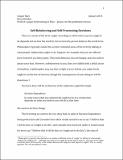Self-Reinforcing and Self-Frustrating Decisions
Author(s)
Hare, Caspar; Hedden, Brian
DownloadHareHeddenSelfReinforcing.pdf (265.8Kb)
OPEN_ACCESS_POLICY
Open Access Policy
Creative Commons Attribution-Noncommercial-Share Alike
Terms of use
Metadata
Show full item recordAbstract
There is a sense of the term ‘ought’ according to which what a person ought to do depends not on how the world is, but on how the person believes the world to be. Philosophers typically isolate this as their intended sense of the term by talking of what people ‘subjectively ought’ to do. Suppose, for example, that you are offered hors d'oeuvres at a fancy party. They look delicious, you are hungry, and you wish to please your host. However, unbeknownst to you, they are riddled with a lethal strain of botulism. A philosopher may say that, in light of your beliefs, you subjectively ought to eat the hors d'oeuvres, though the consequences of your doing so will be disastrous.
Our focus here will be on theories of the subjective ought that imply
Decision Dependence In some cases what you subjectively ought to do at a certain time depends on what you believe you will do at that time.
Date issued
2015-06Department
Massachusetts Institute of Technology. Department of Linguistics and PhilosophyJournal
Noûs
Publisher
John Wiley & Sons
Citation
Hare, Caspar, and Brian Hedden. “Self-Reinforcing and Self-Frustrating Decisions.” Noûs vol. 50, no. 3, June 2015, pp.604–628.
Version: Author's final manuscript
ISSN
00294624
14680068